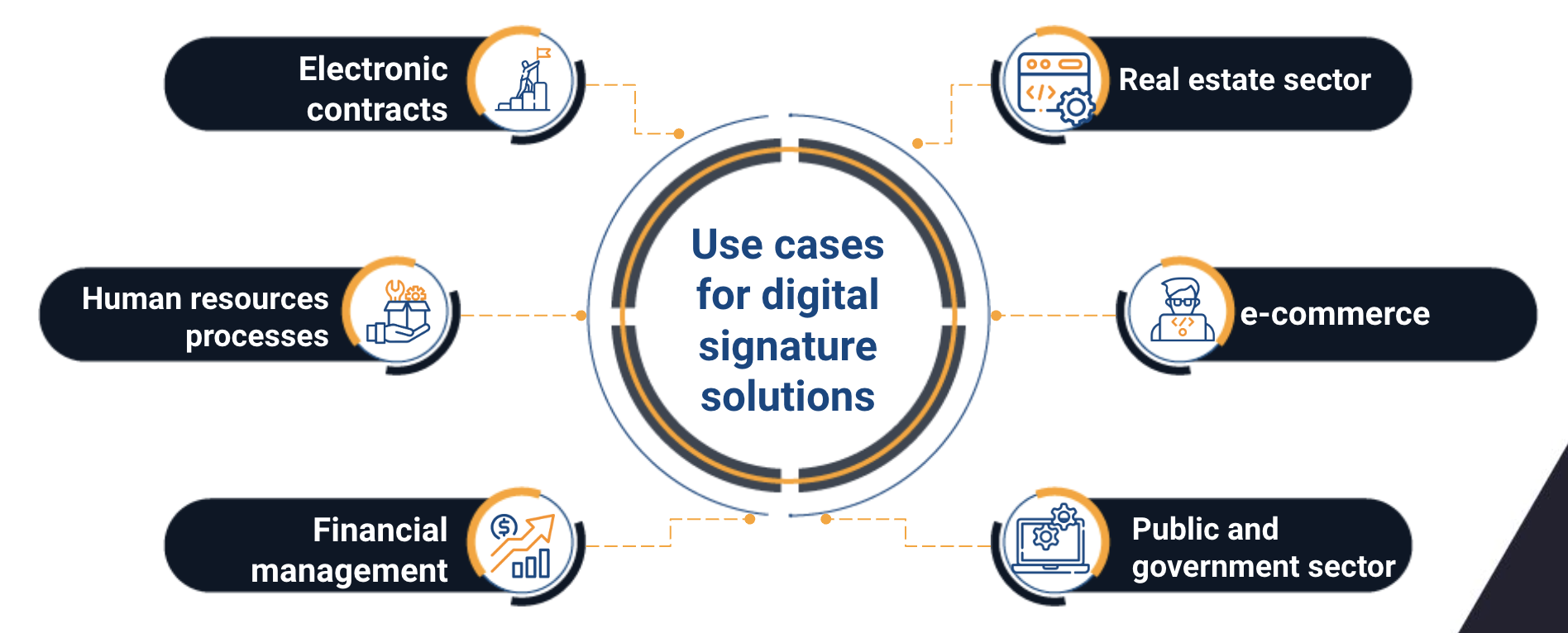If you are in the Human Resources department, see how digital signatures streamline all processes.

Digital signatures have evolved from being a niche tool to becoming an essential component of businesses' digital transformation. This article explores the primary use cases of digital signatures, highlighting how they optimize processes, enhance security, and facilitate the adoption of modern technologies across various sectors.
What are digital signatures, and why are they important?
Digital signatures are a technology that ensures the authenticity, integrity, and non-repudiation of electronic documents. They use cryptographic algorithms to link the signer’s identity to a digital document, ensuring it hasn’t been altered since it was signed.
In a world where efficiency and security are priorities, digital signatures offer a reliable solution for businesses seeking to reduce paper dependency, accelerate processes, and comply with strict regulations.
Use cases of digital signatures
1. Electronic contracts and legal agreements
Digital signatures are widely used for signing contracts and legal agreements. This use case is particularly relevant for:
Legal firms and law offices: They allow clients to sign documents without traveling, streamlining agreement management and reducing response times.
Startups and SMEs: Growing companies can formalize agreements with clients, employees, or suppliers remotely, optimizing resources.
Digital signatures comply with international regulations such as eIDAS (Europe) and ESIGN (United States), making them a legally valid option in many regions worldwide.

2. Human Resources processes
In HR, digital signatures are crucial for managing employment documents more efficiently. Specific use cases include:
Employment contracts: HR departments can digitally sign and send contracts to new employees, even if they are in different locations.
Onboarding forms and internal policies: Employees can sign documents like security policies, procedural manuals, and tax forms in minutes.
Renewals and terminations: Document management in contract renewal or employee termination processes is significantly simplified with digital signatures.
3. Financial and banking management
The financial sector greatly benefits from digital signatures, particularly in these areas:
Account opening: Clients can open bank accounts without visiting a branch, signing all necessary documents online.
Loans and financing: Digital signatures speed up loan approval and formalization, enhancing the customer experience and reducing processing times.
Internal authorizations: Financial entities can use digital signatures in internal processes, such as operation approvals or audits, ensuring traceability and security.

4. Real estate sector
The real estate industry has also transformed thanks to digital signatures. Common use cases include:
Signing sales and lease contracts: They accelerate transaction closures by allowing buyers, sellers, and tenants to sign documents from anywhere.
Mortgage processes: Digital signatures reduce the time required to complete mortgage-related paperwork, improving customer experience.
Property document management: Managing contracts and documents related to real estate becomes more efficient and less prone to human errors.
5. Healthcare sector
The healthcare industry requires solutions that ensure data privacy and security. Digital signatures comply with regulations like HIPAA (U.S.) and are ideal for:
Informed consent: Patients can electronically sign documents authorizing medical procedures, saving time in emergencies.
Medical records management: Digital signatures ensure the authenticity and confidentiality of electronic medical records.
Telemedicine agreements: They enable formalizing agreements between patients and healthcare providers remotely, accelerating care in remote areas.

6. E-Commerce and online sales
In a world where digital transactions are booming, digital signatures add value to processes such as:
Acceptance of terms and conditions: Customers can accept policies and legal terms on e-commerce platforms through digital signatures.
Purchase financing: Online stores offering financing for large purchases use digital signatures to formalize credit contracts.
Distribution agreements: Sellers and distributors can quickly sign contracts, accelerating the integration of new business partners.

7. Public sector and government administration
The digitization of public institutions is a global challenge. Digital signatures play a key role in initiatives such as:
Tax declarations: They allow citizens to sign and submit tax forms electronically, reducing bureaucracy.
Licenses and permits management: Digital signatures simplify obtaining business licenses, building permits, and other government procedures.
Citizen participation: In processes like surveys or digital referendums, digital signatures ensure participation authenticity.
8. Automation and digital transformation
Beyond specific sectors, digital signatures are an essential component in process automation. Companies implementing digital signature technologies can:
Reduce operational costs: They eliminate the need for printing, scanning, and sending paper documents.
Improve customer experience: Processes are faster, more secure, and accessible.
Comply with international regulations: Certified digital signatures facilitate regulatory compliance in a globalized environment.
From simple processes like signing contracts to complex applications in healthcare, finance, and public sectors, digital signatures optimize operational efficiency, strengthen security, and enhance customer experience.
In a world where agility and reliability are essential, adopting digital signatures is no longer optional but a necessity for businesses seeking to remain competitive in the digital age.


